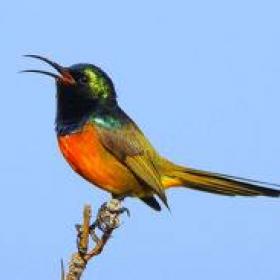
There are few greater challenges facing biodiversity today than that posed by climate change. Climate change impacts on southern African biodiversity will likely be significant, given our high levels of species endemism, particularly when species’ options for moving into newly suitable climate space are constrained by land use change, including fragmentation. South Africa’s fynbos biome, a precious global biodiversity hotspot, is threatened by urbanisation, invasive alien plants and climate change. Fynbos endemic birds have highly constrained global ranges at the tip of a continent, and are a valuable system for testing current hypotheses about endemic species vulnerability and adaptation to climate change in distinctive biodiversity zones. They are also an excellent opportunity for deepening our understanding of vulnerability by looking at the ‘whole bird’- its behavioural, physiological, ecological and demographic responses to change.
Key questions and hypotheses
The research requires several PhD and/or MSc students to build on preliminary demographic, behavioural and ecological data from colour-ringed populations to answer the following questions:
- Do populations and range margins show lower survivorship or reduced breeding output than more central ones?
- What behavioural, plumage or morphological variables are reliable stress indicators?
- Are inland populations more affected by hear stress?
- Are feeding guild and niche breadth good predictors of demographic vulnerability?
- How does urbanization alter adaption options?
- Are nectarivores most vulnerable to frequent fire?
- Is avian pox frequency a function of urbanization?
- Do individuals show spatial (including altitudinal) or phenotypic shifts consistent with predictions?
- How can conservation planning, policy and management respond to these challenges?
FitzPatrick Institute of African Ornithology
Research team